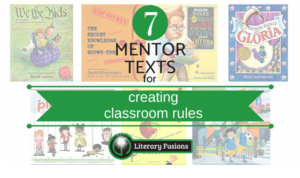 With the introduction of 20 or more small humans into one shared space, establishing order and creating rules in the classroom is imperative! This is usually the first thing we spend time doing in any new school year – partly so that we don’t end up with any casualties – but mostly because, if we want to get anything done (like…maybe some learning??) we have to have mutual understanding of expectations and order.
With the introduction of 20 or more small humans into one shared space, establishing order and creating rules in the classroom is imperative! This is usually the first thing we spend time doing in any new school year – partly so that we don’t end up with any casualties – but mostly because, if we want to get anything done (like…maybe some learning??) we have to have mutual understanding of expectations and order.
The conversation about classroom rules one of our favorite places to make a natural connection to social studies, especially government. As you outline the rules for the various places in school – classroom, hallways, cafeteria, bus, etc. – ask students why they think rules are different in different places? As you practice the rules with your students, ask what would happen if we didn’t have rules? Are are rules equal? Is it ever ok to not follow a rule? As students process the answers to these questions and engage in conversation about the rules in their immediate world, they are better able to make connections when talking about rules at the city/state/national levels.
Maybe government isn’t first up in your curriculum. Try approaching your classroom rules from a citizenship perspective. What makes a good citizen? What are the qualities of a responsible citizen? Why does good citizenship matter? Your students will find that the qualities that make them good classroom citizens are the same qualities possessed by notable citizens in our country’s history.
Of course, we love to infuse literacy into this conversation as well! So, here are seven books you can use as you start the conversation about rules in your classroom!
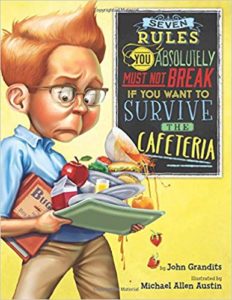 Seven Rules You Absolutely Must Not Break If You Want to Survive the Cafeteria by John Grandits (read the whole blog post here!). This book is an adventure into a child’s thought process as he gets to understand the written rules and, maybe more importantly, the unwritten rules. This is a great mentor text for a variety of grade levels because, with younger students, you can talk about official rules in the cafeteria, and with older students you explore the idea of unwritten rules.
Seven Rules You Absolutely Must Not Break If You Want to Survive the Cafeteria by John Grandits (read the whole blog post here!). This book is an adventure into a child’s thought process as he gets to understand the written rules and, maybe more importantly, the unwritten rules. This is a great mentor text for a variety of grade levels because, with younger students, you can talk about official rules in the cafeteria, and with older students you explore the idea of unwritten rules.
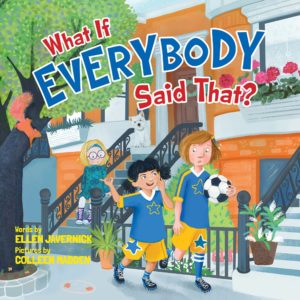 What if Everybody Said That? and What if Everybody Did That? by Ellen Javernick. What would happen if we didn’t have rules or if people didn’t follow them? These books can answer that question! Many times we tell kids what they can and can’t do, but do we really explain why? The hilarious illustrations help kids understand what it would be like if we didn’t have rules!
What if Everybody Said That? and What if Everybody Did That? by Ellen Javernick. What would happen if we didn’t have rules or if people didn’t follow them? These books can answer that question! Many times we tell kids what they can and can’t do, but do we really explain why? The hilarious illustrations help kids understand what it would be like if we didn’t have rules!
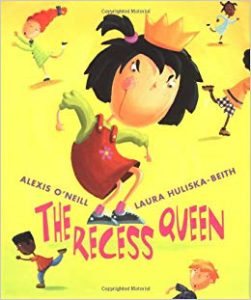 The Recess Queen by Alexis O’Neill. With bright colors and catchy rhymes, this book on the topic of bullying is always a favorite. It’s funny and a little unexpected, and kids love it! It also can be used as a mentor text to discuss bullying and create rules and expectations around that topic.
The Recess Queen by Alexis O’Neill. With bright colors and catchy rhymes, this book on the topic of bullying is always a favorite. It’s funny and a little unexpected, and kids love it! It also can be used as a mentor text to discuss bullying and create rules and expectations around that topic.
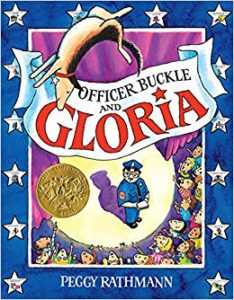 Officer Buckle and Gloria by Peggy Rathmann. Can this book be considered an elementary school “classic” yet? It’s been around for ages and is used in almost every elementary school classroom! This is a great book for talking about safety rules. Sometimes we have rules because society expects certain behaviors, other times we have rules so that we stay safe. Use this book to teach social studies (rules and laws), but also teach about rules at school that are designed to keep us safe!
Officer Buckle and Gloria by Peggy Rathmann. Can this book be considered an elementary school “classic” yet? It’s been around for ages and is used in almost every elementary school classroom! This is a great book for talking about safety rules. Sometimes we have rules because society expects certain behaviors, other times we have rules so that we stay safe. Use this book to teach social studies (rules and laws), but also teach about rules at school that are designed to keep us safe!
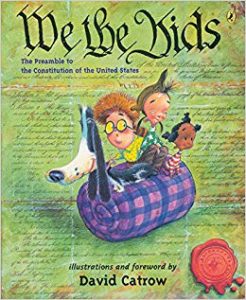 We the Kids:The Preamble to the Constitution of the United States by David Catrow. Politics is not just for grown ups or big people! Use this to teach the constitution (obvious social studies connection), but also make a class constitution! Have all the kids become “Founding Students” and write the rules by which they pledge to abide!
We the Kids:The Preamble to the Constitution of the United States by David Catrow. Politics is not just for grown ups or big people! Use this to teach the constitution (obvious social studies connection), but also make a class constitution! Have all the kids become “Founding Students” and write the rules by which they pledge to abide!
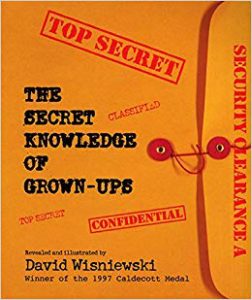 The Secret Knowledge of Grown-ups by David Wisniewski. I have to tell you – this might be my favorite book! It is always a winner with kids. The author shares the “official reasons” why we have rules – you know…the ones given to us by parents. But then he also shares the “real reasons” why we have rules. In the past, I have had kids choose a school rule and explain the “official reason” why the rule exists and then write a fictional story about why it REALLY exists. It’s always fun and the result is a great product to display for Back to School night.
The Secret Knowledge of Grown-ups by David Wisniewski. I have to tell you – this might be my favorite book! It is always a winner with kids. The author shares the “official reasons” why we have rules – you know…the ones given to us by parents. But then he also shares the “real reasons” why we have rules. In the past, I have had kids choose a school rule and explain the “official reason” why the rule exists and then write a fictional story about why it REALLY exists. It’s always fun and the result is a great product to display for Back to School night.
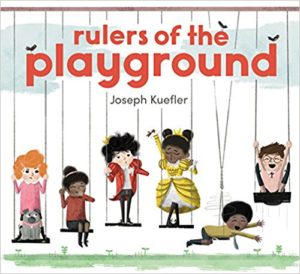 Rulers of the Playground by Joseph Kuefler (read the whole blog post here!). This great read-aloud provides a comical look at the extremes of playground politics. Two self-declared rulers of the playground try to conquer the other’s kingdom, and learn a lesson about leadership, friendship, compromise and sharing in the process. Great opportunity for conversations about citizenship and leadership!
Rulers of the Playground by Joseph Kuefler (read the whole blog post here!). This great read-aloud provides a comical look at the extremes of playground politics. Two self-declared rulers of the playground try to conquer the other’s kingdom, and learn a lesson about leadership, friendship, compromise and sharing in the process. Great opportunity for conversations about citizenship and leadership!




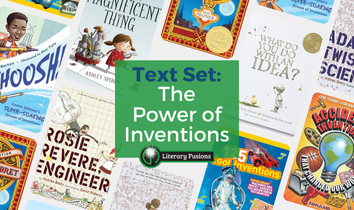
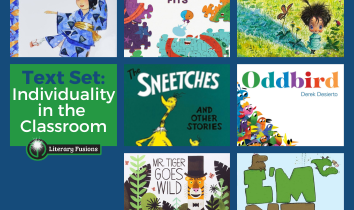
Leave a Reply